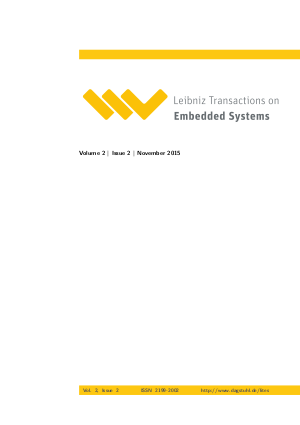Issue
Leibniz Transactions on Embedded Systems, Volume 2, Issue 2
LITES, Volume 2, Issue 2
-
Part of:
Volume:
LITES, Volume 2
Journal: Leibniz Transactions on Embedded Systems (LITES)

Publication Details
- published at: 2015-11-30
- Publisher: Schloss Dagstuhl – Leibniz-Zentrum für Informatik
- DBLP: db/journals/lites/lites2
Access Numbers
- Detailed Access Statistics available here
-
Total Document Accesses (updated on a weekly basis):
0PDF Downloads
Documents
No documents found matching your filter selection.
Document
Complete Issue
LITES, Volume 2, Issue 2
Abstract
LITES, Volume 2, Issue 2
Cite as
LITES, Volume 2, Issue 2, pp. 1-35, Schloss Dagstuhl – Leibniz-Zentrum für Informatik (2015)
Copy BibTex To Clipboard
@Article{LITES-v002-i002,
title = {{LITES, Volume 2, Issue 2}},
journal = {Leibniz Transactions on Embedded Systems},
pages = {1--35},
ISSN = {2199-2002},
year = {2015},
volume = {2},
number = {2},
publisher = {Schloss Dagstuhl -- Leibniz-Zentrum f{\"u}r Informatik},
address = {Dagstuhl, Germany},
URL = {https://drops-dev.dagstuhl.de/entities/document/10.4230/LITES-v002-i002},
doi = {10.4230/LITES-v002-i002},
annote = {Keywords: LITES, Volume 2, Issue 2}
}
Document
From Dataflow Specification to Multiprocessor Partitioned Time-triggered Real-time Implementation
Abstract
Our objective is to facilitate the development of complex time-triggered systems by automating the allocation and scheduling steps. We show that full automation is possible while taking into account the elements of complexity needed by a complex embedded control system. More precisely, we consider deterministic functional specifications provided (as often in an industrial setting) by means of synchronous data-flow models with multiple modes and multiple relative periods. We first extend this functional model with an original real-time characterization that takes advantage of our time-triggered framework to provide a simpler representation of complex end-to-end flow requirements. We also extend our specifications with additional non-functional properties specifying partitioning, allocation, and preemptability constraints. Then, we provide novel algorithms for the off-line scheduling of these extended specifications onto partitioned time-triggered architectures à la ARINC 653. The main originality of our work is that it takes into account at the same time multiple complexity elements: various types of non-functional properties (real-time, partitioning, allocation, preemptability) and functional specifications with conditional execution and multiple modes. Allocation of time slots/windows to partitions can be fully or partially provided, or synthesized by our tool. Our algorithms allow the automatic allocation and scheduling onto multi-processor (distributed) systems with a global time base, taking into account communication costs. We demonstrate our technique on a model of space flight software system with strong real-time determinism requirements.
Cite as
Thomas Carle, Dumitru Potop-Butucaru, Yves Sorel, and David Lesens. From Dataflow Specification to Multiprocessor Partitioned Time-triggered Real-time Implementation. In LITES, Volume 2, Issue 2 (2015). Leibniz Transactions on Embedded Systems, Volume 2, Issue 2, pp. 01:1-01:30, Schloss Dagstuhl – Leibniz-Zentrum für Informatik (2015)
Copy BibTex To Clipboard
@Article{carle_et_al:LITES-v002-i002-a001,
author = {Carle, Thomas and Potop-Butucaru, Dumitru and Sorel, Yves and Lesens, David},
title = {{From Dataflow Specification to Multiprocessor Partitioned Time-triggered Real-time Implementation}},
journal = {Leibniz Transactions on Embedded Systems},
pages = {01:1--01:30},
ISSN = {2199-2002},
year = {2015},
volume = {2},
number = {2},
publisher = {Schloss Dagstuhl -- Leibniz-Zentrum f{\"u}r Informatik},
address = {Dagstuhl, Germany},
URL = {https://drops-dev.dagstuhl.de/entities/document/10.4230/LITES-v002-i002-a001},
doi = {10.4230/LITES-v002-i002-a001},
annote = {Keywords: Time-triggered, Off-line real-time scheduling, Temporal partitioning}
}